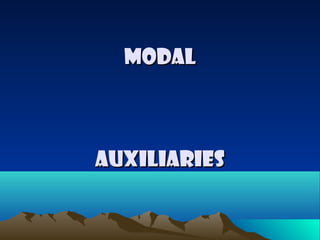
Modal verbs 4th_eso
- 2. SPECULATION & DEDUCTION CERTAINTY AFFIRMATIVE: MUST NEGATIVE: CAN’T POSSIBILITY AFFIRMATIVE: CAN COULD MAY MIGHT NEGATIVE: MAY NOT MIGHT NOT
- 3. ABILITY PRESENT CAN AM / IS / ARE ABLE TO PAST COULD WAS / WERE ABLE TO FUTURE WILL BE ABLE TO
- 4. PERMISSION PRESENT CAN / CAN’T (The most informal way) COULD MAY / MAY NOT MIGHT (The most formal way) PAST COULD WAS / WERE ALLOWED TO
- 5. OBLIGATION PRESENT AFFIRMATIVE MUST HAVE (GOT) TO PRESENT NEGATIVE (Lack of obligation) DON’T / DOESN’T HAVE TO PAST HAD TO (Lack of obligation) DIDN’T HAVE TO PROHIBITION MUSTN’T CAN’T
- 6. ADVICE SHOULD / SHOULDN’T OUGHT TO / OUGHTN’T TO
- 7. THE END